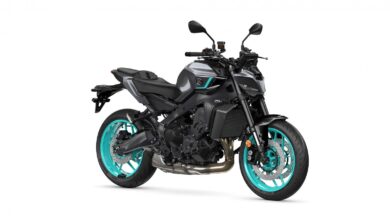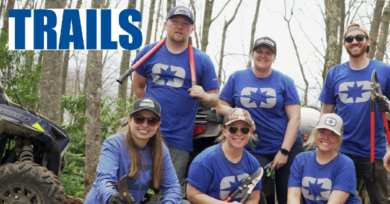April 24, 2006 – ATV Digest
Judgment for Yamaha modifies Yamoto line-up
Yamaha Motor Company, U.S.A., Cypress, Calif., has obtained a consent judgment in its lawsuit against Yamoto Motor Corporation, Union City, Calif. Yamoto has agreed to stop the import and sale of Yamoto products into the United States that Yamaha claimed were copycats of its products.
The lawsuit, filed Oct. 12, 2005 in Los Angeles Federal Court against Yamoto Motor Corporation and Patriot Motorcycles Corporation (Pink Sheets: PMCY), alleged trademark infringement and copyright infringement, among other claims.
Yamaha reached a settlement with Patriot Motorcycles Corp. on Nov. 22, 2005, whereby Patriot agreed to cease the distribution of products under the Yamoto name. The judgment against Yamoto was reached March 14.
“Yamoto entered the U.S. market intending to piggy back off of Yamaha’s superior brand name recognition by selling inferior copycat products that are in clear violation of our U.S. trademark rights,” Yamaha General Counsel Russell D. Jura said in a prepared statement. “That simply was not acceptable to Yamaha and we went to court to protect our rights and hard-earned reputation.”
The consent judgment states, in part, that:
“This judgment fully vindicates our position,” Jura said, “especially since Yamoto admitted that the Yamoto products that it was selling were copies of Yamaha products and that it was infringing upon Yamaha’s reputation and goodwill.”
Sound Topic at “Turn Down the Volume II” Summit
The Off-Road Business Association (ORBA) convened the second “Turn Down the Volume” meeting with the aftermarket exhaust industry to discuss how best to reduce excessive off-highway motorcycle and ATV sound.
Keynote speakers included American Motorcyclist Association (AMA) Pro Racing SX/MX Manager Steve Whitelock and Ralph Gonzalez, U.S. Forest Service spark arrestor certification lead. The meeting was attended by representatives of almost all of the aftermarket exhaust companies, as well as the Motorcycle Industry Council, Kawasaki Motor Corp., USA, California State Parks OHV Division and AMA District 36.
The consensus of the group was that fair and consistent enforcement of AMA sound rules for professional and amateur racing would be one of the most productive measures available to reduce excessive sound. The aftermarket exhaust companies also agreed they would like to see an independent testing process for Pro SX and MX to ensure fair and consistent compliance enforcement as well as a more transparent test procedure to eliminate any perception of inconsistency.
“We are exploring a variety of ways to reduce excessive OHV sound, and we feel that engaging the aftermarket exhaust industry as well as the competition organizations and government agencies that regulate OHVs is a critical component in that effort,” said ORBA Director of Land Use Bill Dart.
Riverside County, Calif. officials sued over new OHV?Ordinance
On April 10, a number of off-road groups filed suit against Riverside County, Calif., alleging that the county’s recently adopted noise and off-highway vehicle ordinances violate state law, ORBA announced in a press release April 11.
The ordinances were passed March 31. The riding ordinance contained a number of restrictions, including that OHVs may only be ridden from noon to 5 p.m., regardless of what day of the week it is. OHVs also are limited to one for every 10 acres. With a notarized statement from contiguous property owners, the limit would be lowered to one OHV per five acres. In either case, a maximum of four OHVs would be allowed, according to ordinance language. To use more than four OHVs, a person or organization would have to obtain a conditional-use permit. Setbacks were set at 100 feet from any property line and 250 feet from any adjacent residence. OHVs may only be used on private property if the above provisions are met.
“Between the noise ordinance, which is the most restrictive of its kind that I have ever heard of, along with the OHV ordinance, the supervisors have banned OHV use for the average property owner,” said Meg Grossglass of the Off-Road Business Association (ORBA).
The lawsuit was filed in Riverside County Superior Court and alleges the noise and OHV ordinances violate various state regulations on four issues. The suits claims that the noise ordinance is inconsistent with the county’s general plan, which is a violation of state planning and zoning laws.
The groups involved in the lawsuit are ORBA, EcoLogic Partners, Inc., the San Diego Off-Road Coalition, the California Off-Road Vehicle Association, the American Motorcyclists Association District 37 and the American Sand Association.
On April 11, the San Bernardino County Board of Supervisors unanimously passed an OHV ordinance that ORBA has characterized as fair to off-roaders in the county and residents.
Forest Service clarifies OHV access issue
The U.S. Department of Agriculture Forest Service has clarified the process used to designate areas that motorized vehicles have access to. The Forest Service outlined the process in a March 23 memo after there was some confusion over an initial draft.
The BlueRibbon Coalition, a national trail-based advocacy group, raised concerns last year about the potential for abuse of interim Forest Service orders on motorized vehicles. The group was concerned access issues would be decided outside the public planning process.
The Forest Service said the purpose of the interim orders is to prohibit wheeled vehicles from leaving existing roads and trails. The memo further explains that Forest Service orders should not be used to close existing trails.
“Unfortunately, anti-access interests had apparently hoped to feature the use of ‘interim’ orders to restrict vehicle travel on a large-scale basis and as a substitute for proper public involvement and analysis,” wrote Paul Turcke, lead counsel for BRC, in a letter responding to the memo. “[The memo] properly refocuses on the importance of public planning to address management challenges, and should clearly establish that ‘interim’ orders are not designed to close existing routes, which have historically received vehicle access. psb




